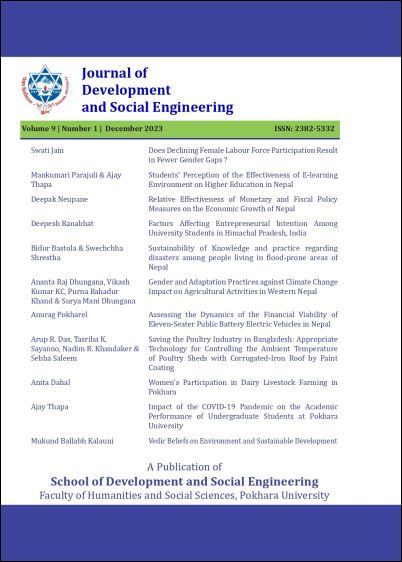Women's Participation in Dairy Livestock Farming in Pokhara
DOI:
https://doi.org/10.3126/jdse.v9i01.70611Keywords:
Farming, Participation, Savings, Gender role, SustainabilityAbstract
This study examines contribution of women participation in dairy livestock farming in Pokhara. For this, two objectives, to assess the integration between dairy livestock enterprise and crop production and to examine the dairy livestock farming income and household food in-security were set.As a commuter zone ward number 5, 18 and 23 of Pokhara Metropolitan City was purposively taken as research area. Those people who were actively engaged in milk business and contributing whole family income and expenditure were purposively taken as universe of this research. Out of those universe, 60 household of women actively engaging in milk business were taken as research sample. Study clearly shows the financial gain to the family from milk business. The saving from milk business itself can pay back initial livestock purchasing investment within a single year. In viewed through the gender prospects livestock farming supports married women in participation on community organization and strengthen the role of women in decision making as a social agent. This business not only engages married women in milk business but also helped to increase the productivity of crops by using cattle manure. Additionally, use of cattle faces in biogas has reduced the fuel wood and fossil fuel consumption and supports sustainable development by providing clean energy together with forest conservation and reduced indoor air pollution. The policies addressing the availability of good source of fodder, business startup fund facilitation, a sustainable market to sell milk, good insurance policy and adoption of cutting-edge technologies can attract young and educated people in the milk business.
Downloads
Downloads
Published
How to Cite
Issue
Section
License
Copyright © Journal of Development and Social Engineering, School of Development and Social Engineering, Faculty of Humanities and Social Sciences, Pokhara University. All rights reserved. The School of Development and Social Engineering, Pokhara University holds the exclusive copyright of all the contents of this journal. No part of this journal may be reproduced or transmitted by any media or publishing organizations including websites without the written permission of the copyright holder. The contents of this journal are available for any citation, using a recognized and proper referencing system.




